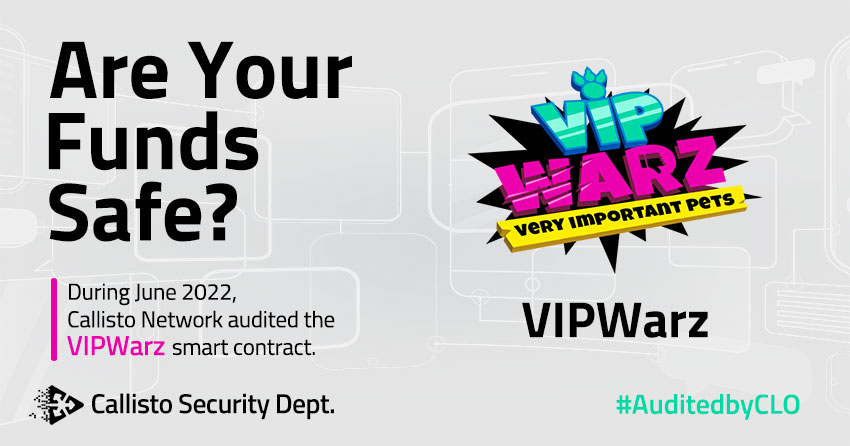VIPWARZ smart contract security audit, conducted by the Callisto Network Security Department during June 2022.
VIPWARZ v2 Security Audit ReportAre Your Funds Safe? Summary
VIPWARZ smart contract security audit report performed by Callisto Security Audit Department
1. In scope Commit 6e3653502ac5dd4908937907fc30715f56e30867
ICO.sol
LockedFund.sol
VVT.sol
2. Findings
In total, 0 issues were reported including:
0 high severity issues.
0 medium severity issue.
0 low severity issues.
In total, 1 note were reported, including:
0 notes.
1 owner privileges.
2.1 Owner Privileges
Severity: Owner Privileges.
Description:
The owner of the VVT token can set/change any address as a farm that have permission to mint tokens.
3. Security practices
Open-source contact.
The contract should pass a bug bounty after the completion of the security audit.
Public testing.
Automated anomaly detection systems. – NOT IMPLEMENTED. A simple anomaly detection algorithm is recommended to be implemented to detect behavior that is atypical compared to normal for this contract. For instance, the contract must halt deposits in case a large amount is being withdrawn in a short period of time until the owner or the community of the contract approves further operations.
Multisig owner account.
Standard ERC20-related issues
Crosschain address collisions. ETH, ETC, CLO, etc. It is possible that a transaction can be sent to the address of your contract at another chain (as a result of a user mistake or some software fault). It is recommended that you deploy a “mock contract” that would allow you to withdraw any tokens from that address or prevent any funds deposits. Note that you can reject transactions of native token deposited, but you can not reject the deposits of ERC20 tokens. You can use this source code as a mock contract: extractor contract source code . The address of a new contract deployed using CREATE (0xf0) opcode is assigned following this scheme keccak256(rlp([sender, nonce])). Therefore you need to use the same address that was originally used at the main chain to deploy the mock contract at a transaction with the nonce that matches that on the original chain.Example: If you have deployed your main contract with address 0x010101 at your 2021th transaction then you need to increase your nonce of 0x010101 address to 2020 at the chain where your mock contract will be deployed. Then you can deploy your mock contract with your 2021th transaction, and it will receive the same address as your mainnet contract.
4. Conclusion
The audited smart contract can be deployed. Only low severity issues were found during the audit.
It is recommended to adhere to the security practices described in pt. 4 of this report to ensure the contract’s operability and prevent any issues that are not directly related to the code of this smart contract.
Appendix
Smart Contract Audits by Callisto Network.
Miscellaneous
Why Audit Smart Contracts?
Our Most Popular Audit Reports.
Trust the Blockchain, Audit the Smart Contracts. Follow Callisto’s Security Department on Twitter to get our latest news and updates!

